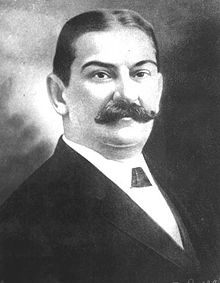Luis Muñoz Rivera
| Luis Muñoz Rivera | |
|---|---|
 |
|
| Resident Commissioner of Puerto Rico | |
|
In office March 4, 1911 – November 15, 1916 |
|
| Preceded by | Tulio Larrínaga |
| Succeeded by | Félix Córdova Dávila |
| Member of the House of Representatives of Puerto Rico | |
|
In office 1906–1910 |
|
| Chief of the Cabinet of Puerto Rico | |
|
In office 1898–1899 |
|
| Personal details | |
| Born |
July 17, 1859 Barranquitas, Puerto Rico |
| Died | November 15, 1916 (aged 57) Luquillo, Puerto Rico |
| Political party | Union Party |
| Spouse(s) | Amalia Marín Castilla |
| Children | Luis Muñoz Marín |
| Occupation | Poet, journalist and politician |
| Religion | Roman Catholic |
Luis Muñoz Rivera (July 17, 1859 – November 15, 1916) was a Puerto Rican poet, journalist and politician. He was a major figure in the struggle for political autonomy of Puerto Rico.
In 1887, Muñoz Rivera became part of the leadership of a newly formed Autonomist Party. In 1889, he successfully ran a campaign for the position of delegate in the district of Caguas. Subsequently, Muñoz Rivera was a member of a group organized by the party to discuss proposals of autonomy with Práxedes Mateo Sagasta, who would grant Puerto Rico an autonomous government following his election. He served as Chief of the Cabinet of this government.
On August 13, 1898, the Treaty of Paris transferred possession of Puerto Rico from Spain to the United States and a military government was established. In 1899, Muñoz Rivera resigned his position within the cabinet and remained inactive in politics for some time. In 1909, he was elected as Resident Commissioner of Puerto Rico and participated in the creation of the Jones-Shafroth Act, proposing amendments before its final approval. Shortly after, Muñoz Rivera contracted an infection and traveled to Puerto Rico, where he died on November 15, 1916. His son, Luis Muñoz Marín would subsequently become involved in politics, becoming the first democratically elected Governor of Puerto Rico.
Luis Muñoz Rivera was born in Barranquitas, Puerto Rico, to Luis Muñoz Barrios and Monserrate Rivera Vazquez. He was the couple's first child and a banquet was offered in celebration. He came from a middle-class family and was not part of Puerto Rico's elite. His father came from one of the first patriarchal lines in Puerto Rico's politics.
(His Paternal Grandfather) decided to make his career in the army and received several recognitions after participating against Simón Bolívar during the Admirable Campaign, and followed his commanding officer Miguel de la Torre to Puerto Rico. He settled in a 400-acre (1.6 km2) farm in Cidra, Puerto Rico, married María Escolástica Barrios and fathered twelve children. He became the town's first mayor from 1818 to 1820 and again in 1840 to 1850.
...
Wikipedia
